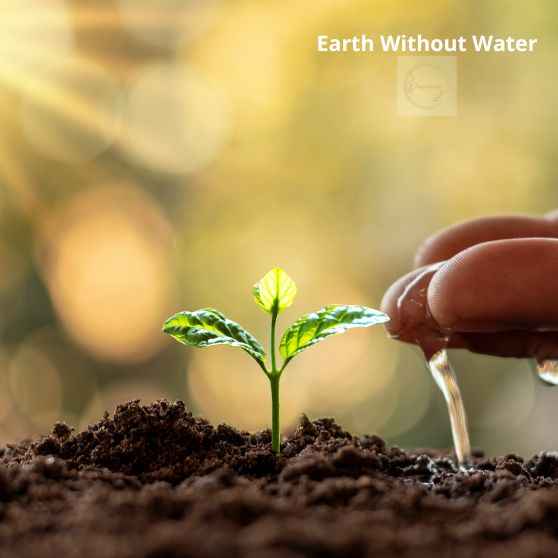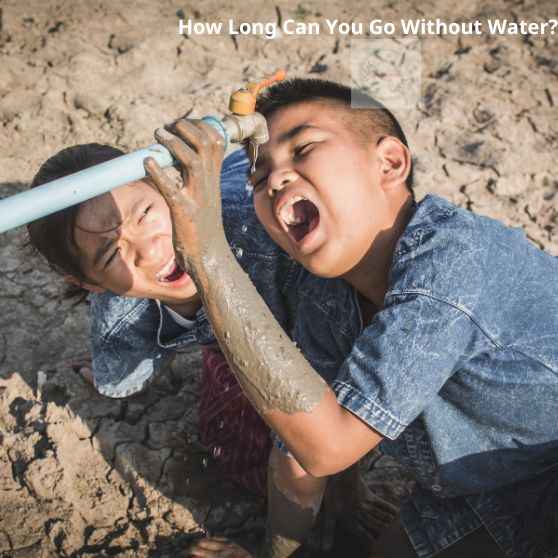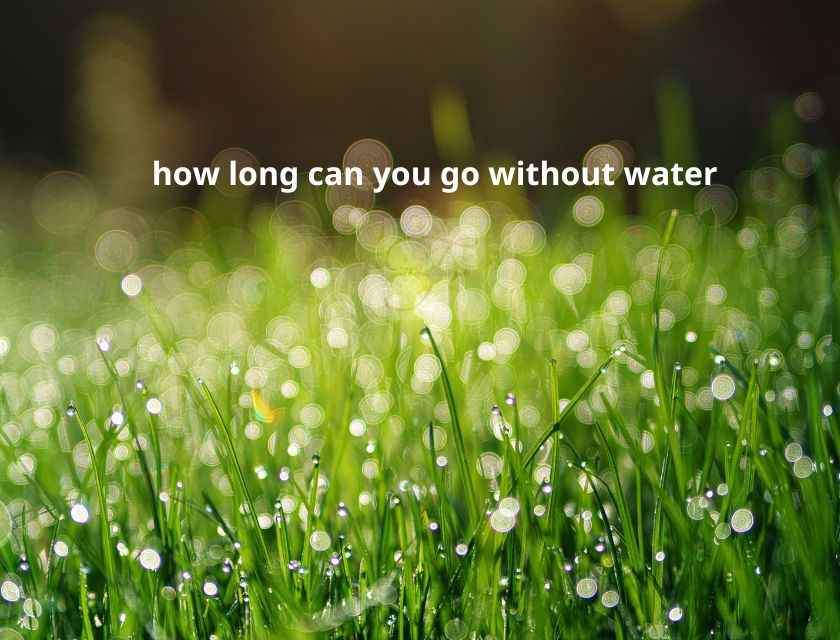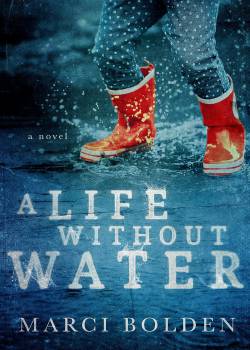How long can you go without water? A general scientific consensus is that humans can go without water for about three days. But, how long can you survive without water, it usually ranges from five days to a week. Experts in wilderness survival guides often refer to the “rule of 3”, they say that humans can live for 3 minutes without air (oxygen), 3 days without water, and about 3 weeks, without needing food.
The world record was set by an 18-year-old Austrian man who went 18 days without food and water in the 70s of the 19th century when he accidentally got locked up in a government house. and was discovered when death was near.
These numbers are of course just a demonstration of humans’ ability to survive without water. However, it also depends on various factors that affect the ability to survive without water such as age, health status, environment, and activity level.
The definition of thirst is “the desire or need to drink water and the dehydration that causes this feeling” according to the Merriam-Webster dictionary. It shows a simpler answer to the question of when our body feels thirsty: when the body does not have enough water, the brain feels the need to replenish water. The body can become dehydrated for almost any number of reasons, but the brain is extremely good at signaling this to us through thirst.
The body needs water as a functional need of life. People will feel thirsty when electrolytes increase and this feeling rushes to the brain, maintaining the feeling of lack of living cells.
According to Unicef, “The general rule is that if you are thirsty, you are already dehydrated.” Thirst is the first sign of dehydration. A person can survive 5 days without water. However, some important factors that contribute to survival such as activity levels and the individual’s overall health such as height and weight can influence this.

How Long Can You Live Without Water, and Why Is The Time Different?
Water is important to the body; it not only helps people maintain thermal regulation but also supports the transport of nutrients or the elimination of unnecessary substances through sweating and urination.
According to the World Health Organization, the time people can survive without water varies depending on modifiable factors such as age, overall health, weight, gender, and food intake. food consumption, environmental conditions, and individual differences. These key factors are broken down as follows.
-
Environmental factors: Environmental factors climate, temperature, and humidity, can affect the length of time you can survive without water.
-
Temperature: When the weather is hot, people of all ages are at risk of dehydration. “Depending on the temperatures the body will be exposed to, humans can survive 100 hours without drinking water if the temperature is average. If the weather is cooler, people can walk longer. In addition, if the body is exposed directly to sunlight, it will be less.” According to Dr. Piantadosi.
Humidity: When humidity is unfavorable, sweat cannot evaporate from the body as quickly, meaning the heat that needs to be released through sweat is ineffective. It will lead to an increase in body temperature, putting you at risk of heatstroke. Heatstroke can lead to loss of consciousness, seizures, and death if not treated.
Activity level: The body uses less water when resting and more water when exercising. Increasing the intensity or duration of exercise will lead to increased heat production in the body and an increased rate of sweating, both of which contribute to dehydration.
Age: Older people have less water in their bodies, making them more susceptible to dehydration, such as from illness or medication side effects. Additionally, according to a book published by the Institute of Medicine in 1993 titled “Hydration Requirements When Exercising in the Heat,” older people have more difficulty tolerating heat due to a reduced ability to sweat or exercise rhythm, or both. However, young children and older adults are at higher risk of dehydration than other age groups.
Health conditions: According to the Mayo Clinic, “Excessive physical exertion increases water loss through sweat, potentially shortening the amount of time a person can survive without water.”
Weight: According to the Centers for Disease Control and Prevention (CDC), a person’s size, weight, and body composition can influence how much water the body stores and uses, which is related to survival time without water; heavier people usually need more water.
Gender: Water needs for women are 2.7 liters of ‘liquid’ water per day, while men need about 3.7 liters of ‘liquid’ water per day, according to the National Institute of Science, Technology, and Technology. National Chinese Medicine.
Food: Food contributes an important part to overall water intake. The Mayo Clinic and Cleveland Clinic both report that “about 20% of daily fluid intake comes from food.” Eating foods with high water content, such as cucumbers, watermelons, and strawberries, will affect the body’s hydration status, allowing people to survive longer without drinking water directly.
How long can humans survive without food? Of course, the body can survive much longer without water. Water makes up 65% of the human body, and it helps blood circulate, carrying nutrients and oxygen to nourish cells. Without water, humans cannot absorb and digest food.
On the other hand, humans can survive without food for up to 1 or 2 months, compared to only about 8 days without water. This depends on each person’s health, hydration status, body fat stores, and other factors.
We need to keep in mind that we must prioritize both food and water for survival. Fasting for long periods leads to serious and debilitating consequences for our health and can lead to organ failure and death.
However, if it is possible to maintain a healthy and balanced diet that can maintain proper body functions, avoid depriving the body for a long period, leading to significant risks. Regret and cause serious health consequences.

How Long Can You Live Without Water, and What Can Help Improve The Chance Of Surviving Without Drinking Water?
The important thing is that surviving without water for a long time is not simple at all. In mild cases, it will affect and lead to dangerous complications related to the body, and in severe cases, it can lead to death. That is why finding a source of water or being able to replace it is one of the top priorities in survival situations.
To improve and increase your chances of surviving without drinking water, pay attention to the following:
Find alternative water sources: We can find other alternative water sources such as dew, fruits with high water content, or plants with moisture that “always has a certain amount of water in its trunk”. We can clean or filter the water if there is nothing to be sure about its safety.
Moisturize your body: Minimize sweating by finding and hiding in the shade, and avoid overdoing anything in hot weather. Covering your body can also help reduce moisture loss through evaporation.
Conserve available water: Minimize urination and sweating by avoiding salty or spicy foods, both of which can increase the body’s need for water.
Maintain a cool temperature: Try to maintain your body temperature to avoid overheating your body because too high a temperature can cause your body to lose water faster. Find places where you can take shelter or provide shade so your body can cool down.
Prioritize water use: Reasonably use available water for domestic purposes first, maintaining hygiene is also an equally important part, but save and save water for essential needs.
Reduce exertion: Do not engage in unnecessary physical activity to reduce water loss through sweat.
Seek help: Try to signal for help or seek help from others. Timely rescue and medical attention can greatly increase the chances of survival in dangerous situations.
How Long Can You Go Without Food? Does Water In Food Help When Drinking Water Is Restricted?
The length of time one can survive without water depends heavily on the amount of water stored in food, which aids in hydration when water intake is limited. Of course, this type of food can only help prolong life to a certain extent.
Many cultivated or wild plants naturally contain water, and “must know about wilderness survival,” which can contribute to overall hydration. Fruits such as mangoes, pears, watermelons, oranges, strawberries, and vegetables such as cucumbers and lettuce all contain a high water content. Survival experts recommend consuming these foods to maintain hydration levels, especially when your access to drinking water is limited.
However, it is important for “wildlife survival” experts to remind us that, although food can contribute to the hydration process, it absolutely cannot replace drinking water. Especially in situations where our water intake is inaccessible or severely limited.
When the body’s need for hydration is high, such as during intense physical activity or when the weather is very hot. In such cases, it is of utmost importance to prioritize drinking water to prevent dehydration, which can lead to life-threatening complications.

How Long Can You Survive Without Water, and What Body Functions Are Most Affected By Not Drinking Water?
The human body will only be affected without water. Water is essential for each different functional organ of the body. Prolonged water deficiency will affect, and can be dangerous, several systems:
Water and fluid balance: To maintain proper hydration levels, water is essential. Not only does it help regulate body temperature, but it also aids in digestion to help transport nutrients and waste.
Kidney function: Water plays an important role in kidney function. It helps transport nutrients to the kidneys and waste to the bladder. In addition, it also helps filter toxins from the blood, creating urine. Even mild dehydration can damage kidney function, causing the kidneys to not function normally, and leading to the accumulation of waste in the body.
Brain function: Drinking enough water is key to good brain function. Dehydration can seriously affect cognitive function and concentration. Research shows that not having enough water in the human body can negatively impact the ability to concentrate, causing confusion, headaches, dizziness, and in severe cases, can lead to unconsciousness or coma. We have reduced brain activity.
Skin and overall health: Drinking enough water will keep your skin hydrated and can promote collagen production. Dehydration can affect the skin, making it dry, less elastic, and susceptible to problems such as itching and discomfort. Additionally, health can also deteriorate quickly without water.
Heart function: Dehydration reduces blood volume, causing the heart to work harder to circulate blood throughout the body. This can lead to increased heart rate and potential complications for people with pre-existing heart disease.
Digestive system: Maintaining water levels in the human body is also important to promote bowel movements. Lack of water can cause constipation because the body takes water from stool to maintain hydration, leading to difficulty defecating.
It is important to note that the human body continuously loses water through breathing, sweating, urination, and bowel movements. To maintain proper bodily functions, it is important to regularly replenish lost fluids by drinking water and other hydrating fluids. Severe dehydration can be life-threatening and requires immediate medical attention.
What Precautions are Helpful For A Person Whose Access To Water Is Restricted While Out In Nature?
Short or long field trips, when access to water is limited, while out in nature. We must always remember that it is important to take preventative measures to ensure adequate hydration and prevent dehydration. Some useful precautions for a trip:
Bring enough water: Water is always a top priority; always bring enough water, depending on the intensity of the outdoor activity and how long it lasts. A general rule of thumb for Survival Experts is to “carry at least one liter of water per hour of moderate activity.”
Plan: Research and thoroughly research the area you are going to determine if there is an alternative natural water source available. Plan your route to access these resources when needed.
Filter or purify water: Carry a portable personal water purifier, filtration tablets, or UV purifier to treat disease-carrying bacteria from natural water sources such as streams or rivers. It will help make the water safe to use by removing bacteria and other contaminants.
Save water: Use water scientifically and economically. Do not waste money during the trip, such as on cooking or drinking water.
Choose the right time and location: Carefully review weather-related forecasts to schedule your outdoor activities for cooler times to reduce water loss through sweat. Choose paths with many trees or resting spots when possible.
Dress appropriately: Wear light, breathable, sweat-absorbent clothing to keep the body cool and reduce dehydration.
Monitor hydration levels: Always listen to your body’s signals. Thirst, dry mouth, dizziness, or dark urine are signs your body is warning you that you are dehydrated. Drink water regularly when you don’t feel thirsty.
Consume electrolytes: Replenish electrolytes lost through sweat when sweating excessively. By consuming electrolyte tablets, sports drinks, or electrolyte-rich foods, bananas or nuts.
Bring water-rich foods: Foods with high water content must be brought on the trip, such as fruits (watermelon, oranges), cucumbers, and lettuce, to supplement your hydration needs.
Limit alcohol and caffeine: Stimulants can contribute to dehydration. Reduce their consumption, especially when water is scarce.
Rest in the shade: Rest in shaded areas to avoid overheating and excessive sweating, which leads to faster dehydration.
Store emergency water: Consider carrying emergency water supplies, such as water filter straws or emergency water bags, as a backup.
Always prioritize your safety and health when exploring nature with limited access to water. Dehydration can be dangerous, so being prepared and paying attention to your hydration needs is essential.

